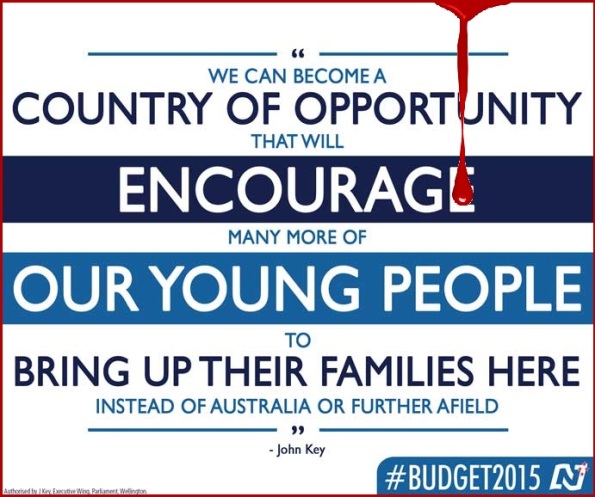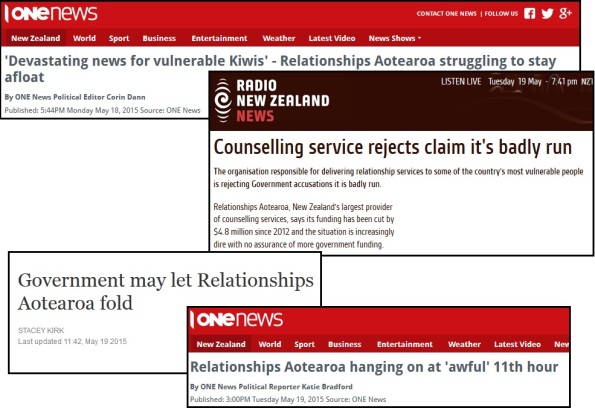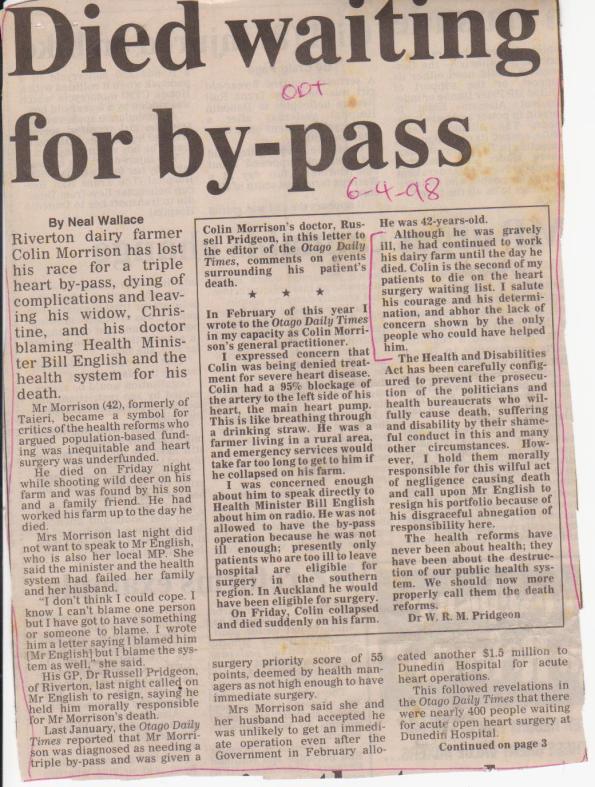Government Minister sees history repeat – responsible for death
.
.
The last few weeks have produced some curious stories from the media, relating to the current government that, at first glance, have no common thread linking them.
Closer scrutiny yields a different perspective…
1 April 2009
National implements first round of tax cuts.
According to Dear Leader Key, the 2009 tax cuts cost the government $1 billion;
“…The tax cuts we have delivered today will inject an extra $1 billion into the economy over the coming year, thereby helping to stimulate the economy during this recession. More important, over the longer term these tax cuts will reward hard work and help to encourage people to invest in their own skills, in order to earn and keep more money.”
1 October 2010
National carries out second round of tax cuts.
According to information obtained from Parliamentary Library in May 2012, and released by the Greens, the 2010 tax cuts cost the country an additional $2 billion;
The Green Party has today revealed that the National Government has so far had to borrow an additional $2 billion dollars to fund their 2010 tax cut package for upper income earners.
New information prepared for the Green Party by the Parliamentary Library show that the estimated lost tax revenues from National’s 2010 tax cut package are between $1.6–$2.2 billion. The lost revenue calculation includes company and personal income tax revenues offset by increases in GST.
Cost of both tax cuts, in terms of lost revenue: $2.6 billion – $3.2 billion, per annum.
8 May 2014
Then-Minister for Housing, Nick Smith confirms in Parliament that National has been demanding multi-million dollar dividends from Housing New Zealand;
“The average dividend under the 5 years so far of this Government has been $88 million. The dividend this year is $90 million.”
The dividend payable does not include taxes paid by Housing NZ.
24 September 2014
Fonterra cuts payout to farmers for dairy milk solids by 70 cents to $5.30/kg milk solids.
6 October 2014
Dear Leader Key reveals that the international fall in dairy prices will affect the government’ tax revenue. Key states;
“It can have some impact because if that’s the final payout, the impact would be as large as $5 billion for the economy overall, and you would expect that to flow through to the tax revenue, both for the 14/15 year and the 15/16 year...”
Reported by TV3’s Brook Sabin on the same day;
“A big state-house sell-off is on the way, and up to $5 billion-worth of homes could be put on the block.
The shake-up of the Government’s housing stock will be a key focus for the next three years, with Finance Minister Bill English to lead it.
On the block is everything from a tiny 75 square metre two-bedroom state house in Auckland’s Remuera, on the market for $740,000, to a three-bedroom home in Taumarunui for just $38,000. Thousands more properties will soon hit the market.”
10 December 2014
Fonterra announced that payouts to farmers would drop from $5.30/kg of milk solids to $4.70/kg. A Fairfax report states;
The predicted payout could hurt the national economy for a couple of years, including tax revenue.
28 January
Dear Leader Key announced the sale of 1,000 to 2,000 state houses within the year, and suggested there might be further sales later.
30 April
Fonterra announces further reduction of milk solid payout to farmers from $4.70/kg milk solids to $4.50/kg of milk solids.
6 May
National announced that it’s entire stock of 370 state houses in Invercargill, and 1,250 in Tauranga, would be put on the market to be sold off.
22 May
National’s 2015 Budget included;
- Dumping the $1,000 Kiwisaver ‘kick-start’ government contribution
- $684 million deficit for 2014/2015
- a new travel tax on arriving/departing airport travellers
- extension of a telecommunications tax to fund government’s rural broadband expansion programme
31 May
A story in the NZ Herald by Lynley Bilby reported that schools throughout the country were cutting back on their activities due to funding constraints;
Financially strapped secondary schools are cutting back on classroom activities, dropping field trips, ditching science experiments and even removing courses after a crackdown on parent donation rules.
[…]
In one case a secondary school had to abandon an NCEA Level 2 biology field trip to the beach because it could not afford to hire a bus.
The science teacher had to apply to the New Zealand Qualifications Authority to alter the data collection assessment so the students would not fail.
Another school was forced to alter its science curriculum by reducing experiments to trim costs.
One school said it had done away with activities outside the school gates, including a sea kayaking standard for year 12 physical education students.
Principals reported outdoor education programmes, food, hospitality and technology courses could be affected by the funding guidelines.
[…]
The recently released Budget saw the Government fund school operational grants to the tune of $1.32 billion for the 2015/16 financial year.
But the NZSPC [New Zealand Secondary Principals’ Council] said that was not enough to meet costs, particularly for low decile schools.
It is apparent that state funding of education is inadequate, and schools are either having to make drastic cuts to “classroom activities, dropping field trips, ditching science experiments and even removing courses” – or raise “voluntary donations” from parents. Those “donations” and fundraising events by parents and teachers raised more than $357 million in 2012, an increase of $16 million from 2011.
Nearly a third of a billion dollars – that is the shortfall of full funding of education in this country.
1 June
National announced the launch of so-called “social bonds“, where;
…the Government will pay a return to investors, determined by whether or not agreed social targets have been achieved.
The Government said social bonds were about the private and public sector organisations operating together to fund and deliver services.
This year’s Budget set aside $28.8 million to fund what is essentially contracting out some mental-health services to private investors. As Health Minister, Dr Jonathan Coleman explained in Parliament the next day;
” One of the benefits of social bonds is that they protect service providers by shifting financial risk away from the providers and on to investors who provide the funding and who are better placed to absorb risk…
[…]
…social bonds are an exciting financial instrument with the potential to revitalise social policy delivery and inject private sector funding and innovation into the sector.”
Note the term used by Dr Coleman (quoting from a Dept of Internal Affairs report); “financial instruments”. According to investopedia.com, a “financial instrument is defined as;
A real or virtual document representing a legal agreement involving some sort of monetary value. In today’s financial marketplace, financial instruments can be classified generally as equity based, representing ownership of the asset, or debt based, representing a loan made by an investor to the owner of the asset.
[…]
Financial instruments can be thought of as easily tradeable packages of capital, each having their own unique characteristics and structure. The wide array of financial instruments in today’s marketplace allows for the efficient flow of capital amongst the world’s investors.
In effect, funding for mental health services is being transferred from the State – the traditional source – to private investors. Plainly put – National is seeking investment funding for mental health services.
These so-called “social bonds” appear to be a continuation of privatisation-by-stealth.
Interestingly, the right-wing think-tank, ‘New Zealand Initiative‘ (formerly the Business Roundtable and NZ Institute) published a report in March advocating the use of social bonds, and calling for the government to implement them. Three months later, National did precisely that.
As the government’s tax revenue was slashed by between $2.6 billion – $3.2 billion, per annum, after the 2009 and 2010 tax cuts, National’s tax-take and expenditure was further put under pressure by the 2007/08 Global Financial Crisis; the resulting Great Recession; rising unemployment; tumbling dairy pay-outs; and the Christchurch re-build.
National’s much heralded prediction of a $372 million Budget surplus this year collapsed into a massive $684 million deficit – a turn-around of nearly a billion dollars.
A billion dollars – the cost of the 2009 tax cuts.
But added to the fiscal deficit is another deficit; the hidden social costs which New Zealanders are slowly, belatedly, waking up to.
Community organisations are winding back, or closing down completely;
.
.
.
.
State assets such as housing and schools are suffering a lack of maintenance, the likes of which we have seen only in Third World nations. The recent case of Northland College in Kaikohe revealed a badly run-down facility that was so delapidated that police asked to use them for training simulations because they represented the closest thing available to a “ghetto environment”, according to school principal, Jim Luders.
Luders’ description of his school is hard to believe in 21st century New Zealand;
“The conditions are appalling. They’re unsafe. There’s water leaks, mould, asbestos in parts. It’s without doubt the worst school stock in New Zealand.
I would challenge any school to send in photos that are worse.”
.
.
Back in 2008, an ERO report highlighted the poor state of Northland College. Seven years later, the problem remains unchanged.
New Zealand’s State housing does not fare better. TVNZ’s Corin Dann wrote this piece on 24 March, which should have raised alarm bells throughout the nation (it did not);
The Finance Minister is signalling a deferred maintenance bill for the country’s state houses of $1.2 billion will have to be met by the government in future.
Community housing providers looking to buy state houses off the government say they believe Housing New Zealand has failed to carry around $1.2 billion in maintenance on state houses.
[…]
Mr English says the lack of maintenance on state houses is concerning and that in the long run the government will need to invest the $1.2 billion dollars in state houses to get them up to scratch.
[…]
When asked why Housing New Zealand had not spent as much money as it should have on maintenance, Mr English put the blame partly on the previous Labour government saying they had chosen to build new state houses rather than fix up old ones.
However, when pressed he conceded that “looking back everyone could have performed better”.
$1.2 billion dollars. Half the cost of the 2010 tax cuts.
Which, in part, explained why the Salvation Army assessed National’s offer to buy some State houses – and promptly ran a mile. As the SA’s spokesperson, Major Campbell Roberts stated, with crystal clarity;
“We would be faced with significant maintenance issues, houses which have got the wrong tenants … we would also need to do extensive development.
We would be putting so much resource into this that we could not actually put resource into anything else.
We can’t guarantee that we would be able to improve things for the state tenants, which is exactly what we would want to do by taking [the properties] over at this stage, on our own.”
Community Housing Aotearoa director, Scott Figenshow, was even more to the point;
“Our members are very concerned about the families they work with, and are only interested if they can do a better job than Housing New Zealand. At the moment the sums simply don’t stack up.
Last month the Government confirmed $1.2 billion of deferred maintenance on the state housing stock. Why would a provider want to purchase a liability?”
Figenshow suggested, instead, that Government reinvest the $220 million it was forecast to receive in tax and dividends from Housing NZ, back into much needed maintenance and upgrades.
For two year old Emma-Lita Bourne, tenant of a State house in Otara, South Auckland, the situation is academic. She died last August living in an environment that was clearly not conducive for human health and well-being;
Two-year-old Emma-Lita Bourne died in Auckland’s Starship Hospital in August last year following a brain haemorrhage.
She had been taken to hospital with a fever, which turned out to be a form of pneumonia.
In his findings, released on Thursday, coroner Brandt Shortland said pneumonia played a part in Emma-Lita’s death and the Housing New Zealand home in Otara where her family lived may have been to blame for her ill-health.
Other children in the family also became sick while the family was living there, with one suffering from rheumatic fever.
[…]
In May 2014, Emma-Lita’s family had been fast-tracked up the waiting list to be transferred to a better state house, because of the rheumatic fever risk.
Although they’re now living in a different home, the move didn’t happen before Emma-Lita’s death.
Housing Minister Nick Smith said the government’s policy to fast-track those at risk of rheumatic fever into better homes has helped 270 families.
As Radio NZ reported Coroner Brandt Shortland’s findings;
“In my view, the house unfortunately was unhealthy for this family.
I am of the view the condition of the house at the time being cold and damp during the winter months was a contributing factor to Emma-Lita’s health status.”
Housing NZ’s general manager of tenancy services, Kay Read, accepted the likelihood of a link;
“Our responsibility is to provide warm, safe and dry housing and, from the reports in this situation, it appears that we’ve failed.”
The above Radio NZ story features photos of another Housing NZ property also in a delapidated condition, with mould and condensation streaming down the walls. The property is tenanted.
Interviewed on Radio NZ’s ‘Morning Report‘, Minister for Housing, Bill English, denied that money was the core problem of run-down Housing NZ properties;
“They’ve done a very large scale programme – insulated every house that it can, which is 48,000 houses over the last four or five years.
It’s got to deal with the same limitations of process as everybody else, it’s got to get consents, it’s got to find a workforce, but it’s not short of money to do the job.”
English’s assurance that Housing NZ “not short of money to do the job” appears to be contradicted by Housing NZ’s 2013/14 Annual Report;
The responsive repairs programme, which includes work on vacant properties, is dependent on demand, which was higher than expected in 2013/14. Consequently, the budget was overspent due to higher volumes of work orders. The average cost per work order was also higher as a result of more comprehensive repairs and upgrades being carried out on vacant properties. To mitigate this overspend, we deliberately reduced the planned maintenance programme, which decreased the percentage of maintenance spend on planned activity. [p28]
Furthermore, on page 36 of the 2013/14 Annual Report, Repairs and Maintenance is given as $220 million for the period.
This is $1 billion less than the $1.2 billion quoted by Bill English to TVNZ’s Corin Dann on 24 March, this year.
Whilst clouded in waffle, English admitted that “the system” (ie; government and Housing NZ) was responsible for this little girl’s death;
“Regardless of the cause it’s a tragedy for this family. It appears that while the system worked to some extent, we’ve got to test whether it was responsive enough quickly enough to the very real needs of this family.
They didn’t really have the option of ordering a higher grade of insulation for the house.
We’ve got a strong focus on organising the government services around vulnerable families – and this is a vulnerable family – rather than expecting those vulnerable families to find their way around various government departments.
This type of case should illustrate I think to the people making public policy, including us, that we’ve got some way to go yet to be as responsive as we should be when there’s serious issues going on in this family.”
Unfortunately, this is not the first time that New Zealanders have died for lack of adequate state funding of social services. For Minister Bill English, this is no doubt a matter of déjà vu, bringing back memories of late Northlander, Rau Williams, and late Southland farmer, Colin Morrison;
.
.
The 6 April 1998 ‘Otago Daily Times’ story stated;
Riverton dairy farmer Colin Morrison (42) has lost his race for a triple heart by-pass, dying of complications and leaving his widow, Christine, and his doctor blaming Health Minister Bill English and the health system for his death.
[…]
Mrs Morrison last night did not want to speak to Mr English, who is also her local MP. She said the minister and the health system had failed her family and her husband.
“I don’t think I could cope. I know I can’t blame one person but I have got to have something or someone to blame. I wrote him a letter saying I blamed him [Mr English] but I blame the system as well”, she said.
His GP, Dr Russell Pridgeon, of Riverton, last night called on Mr English to resign, saying he held him morally responsible for Mr Morrison’s death.
A month later, then-Health Minister Bill English conceded that his government’s “booking system” was a failure – but not before others died on his watch as Health Minister;
.
.
Bill English did not resign, though National were swept from office the following year by Helen Clark’s Labour-led coalition.
English is now Minister for Housing.
And once again, people are dying.
.
.
.
Addendum1
The National government does not have money to spend on refurbishing state housing, but it does have money for other projects;
.
.
Addendum2
The National government does not have money to spend on refurbishing state housing, but it does have money for other projects;
.
.
Addendum3
The National government does not have money to spend on refurbishing state housing, but it does have money for other projects;
.
.
.
.
References
Parliament: Hansards – Tax Cuts – Implementation
Scoop media: Govt’s 2010 tax cuts costing $2 billion and counting
Parliament: Hansards – Housing, Affordable—Progress and Management of Housing New Zealand
Agrimoney.com: Dairy rout spurs $4bn cut to Fonterra milk payout
Hive News: Treasury re-crunching Budget numbers for low Fonterra payout
TV3 News: State housing sell-off worth $5B
Fairfax media: Slashed Fonterra payout will affect all NZers
Radio NZ: PM states housing intentions
Otago Daily Times: Fonterra cuts dairy payout forecast
Radio NZ: Tauranga, Invercargill state houses to be sold
Radio NZ: Budget 2015 – What you need to know
Fairfax media: International airfares will rise new departure tax
Radio NZ: Telecommunications tax will hit consumers
NZ Herald: Secondary schools to slash spending
Radio NZ: Social bond system to target mental health
Parliament: Hansards – 5. Mental Health Services—Social Bonds
Investopedia.com: Financial Instrument
NBR: Roundtable and NZ Institute morph into new libertarian think tank
NZ Intiative: Social Impact Bonds
Government Economics Networks: The case for social bonds: A new way of financing and delivering social services
Fairfax media: Budget 2014 – The essential guide
Dominion Post: Women’s Refuge cuts may lead to waiting lists
NZ Herald: Govt funding cuts reduce rape crisis support hours
TV1 News: ‘Devastating news for vulnerable Kiwis’ – Relationships Aotearoa struggling to stay afloat
Fairfax media: Government may let Relationships Aotearoa fold
TV1 News: Relationships Aotearoa hanging on at ‘awful’ 11th hour
Radio NZ: Counselling service rejects claim it’s badly run
NZ Herald: Northland College students stuck with ‘worst classrooms in New Zealand’
Radio NZ: Northland ‘slum’ school fix-up very slow
TV1 News: English concerned by State House deferred maintenance bill
Radio NZ: Salvation Army won’t buy state houses
Fairfax media: Salvation Army says no to state houses
NZCity: Girl’s death should spur action – Greens
Radio NZ: Damp state house linked to child death
Radio NZ: State housing criticism valid, says English
Housing NZ: 2013/14 Annual Report
Radio NZ: English responds to criticism of state houses (Alt. Link) (audio)
Dunedin Star: Death – the Northland Way
NZPA: English agrees system flawed
TV1 News: Government accused of wasting $11.5 million on wealthy Saudi farmer
NZ Herald: PM defends $30m payout to Rio Tinto
NZ Herald: John Key defends cost of flag referendums
Additional information
Mana News: Housing under neoliberalism
NBR: Matthew Hooton – Gulf games fail to deliver
NBR: Matthew Hooton – Flying sheep endanger McCully
NZ Herald: Bryce Edwards – Political roundup – The bizarre ‘bribery’ and flying sheep scandal
NZ Herald: Dita De Boni – Kiwis hoodwinked over state housing
Radio NZ: Demand increasing on schools to fund out classroom activities
Radio NZ: Government hikes up Housing NZ dividend almost 20 percent (audio)
Previous related blogposts
“It’s fundamentally a fairness issue”- Peter Dunne
Housing; broken promises, families in cars, and ideological idiocy (Part Tahi)
Housing; broken promises, families in cars, and ideological idiocy (Part Rua)
Housing; broken promises, families in cars, and ideological idiocy (Part Toru)
The cupboard is bare, says Dear Leader
.
.
.
This blogpost was first published on The Daily Blog on 6 June 2015.
.
.
= fs =
-
24 June 2015 at 6:11 am“I don’t know the details of that particular family” – Social Development Minister Anne Tolley « The Daily Blog
-
29 June 2015 at 8:02 am“I don’t know the details of that particular family” – Social Development Minister Anne Tolley | Frankly Speaking...
-
13 September 2015 at 6:56 amNational’s blatant lies on Housing NZ dividends – The truth uncovered! « The Daily Blog
-
18 September 2015 at 8:02 amNational’s blatant lies on Housing NZ dividends – The truth uncovered! | Frankly Speaking...
-
2 October 2015 at 8:01 amOn ‘The Nation’ – Anne Tolley Revealed | Frankly Speaking...
-
1 November 2015 at 10:43 amState houses – “wrong place, wrong size”? « The Daily Blog
-
6 November 2015 at 8:00 amState houses – “wrong place, wrong size”? | Frankly Speaking...
-
23 November 2015 at 8:04 amWellingtonians say; “Everyone deserves a home – no more homelessness!” « The Daily Blog
-
28 November 2015 at 8:01 amWellingtonians say; “Everyone deserves a home – no more homelessness!” | Frankly Speaking...
-
2 July 2016 at 8:01 amJohn Key – we will not be held to ransom! | Frankly Speaking...
-
3 July 2016 at 8:02 amPark-up in Wellington – People speaking against the scourge of homelessness | Frankly Speaking...
-
10 July 2016 at 11:46 amNational and the Reserve Bank – at War! « The Daily Blog
-
15 July 2016 at 8:02 amNational and the Reserve Bank – at War! | Frankly Speaking...
-
17 July 2016 at 8:03 amRebuilding the Country we grew up in – Little’s Big Task ahead | Frankly Speaking...
-
20 November 2016 at 8:01 amWhen Life is a Lottery | Frankly Speaking...
-
26 May 2017 at 8:02 pmSteven Joyce rails against low mortgage interest rates; claims higher interest rates “beneficial” | Frankly Speaking...
-
18 February 2018 at 8:01 amNational’s housing spokesperson Michael Woodhouse – delusional or outright fibber? | Frankly Speaking...
-
28 May 2018 at 8:03 amThe Mendacities of Ms Amy Adams – 2,000 more state houses?! | Frankly Speaking...
-
17 June 2018 at 8:01 amJudith Collins wins a Hypocrisy Award | Frankly Speaking...













